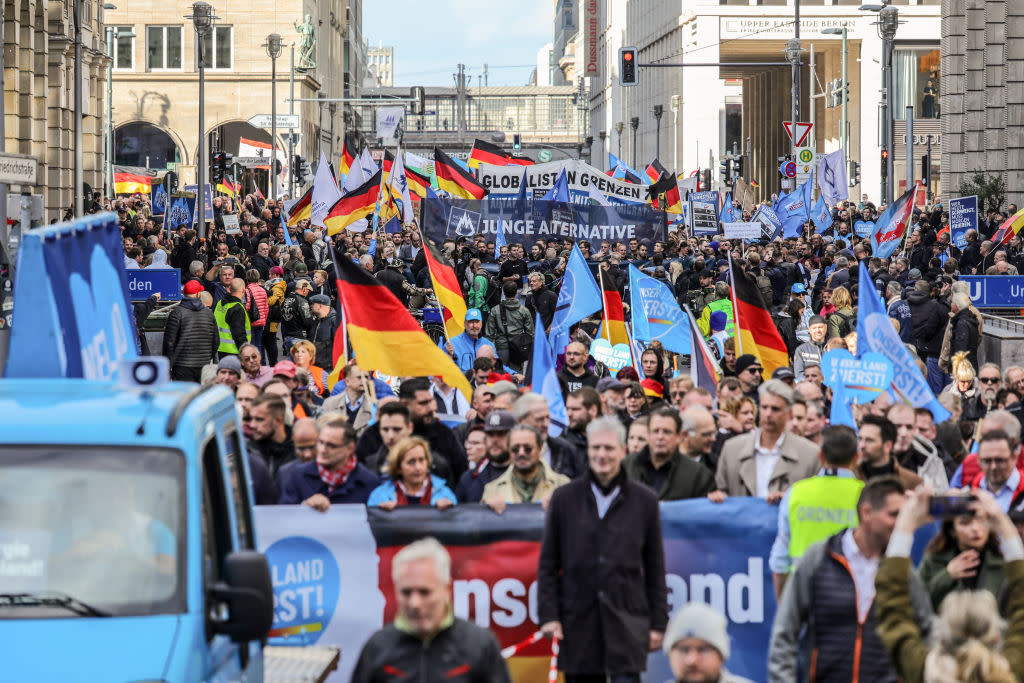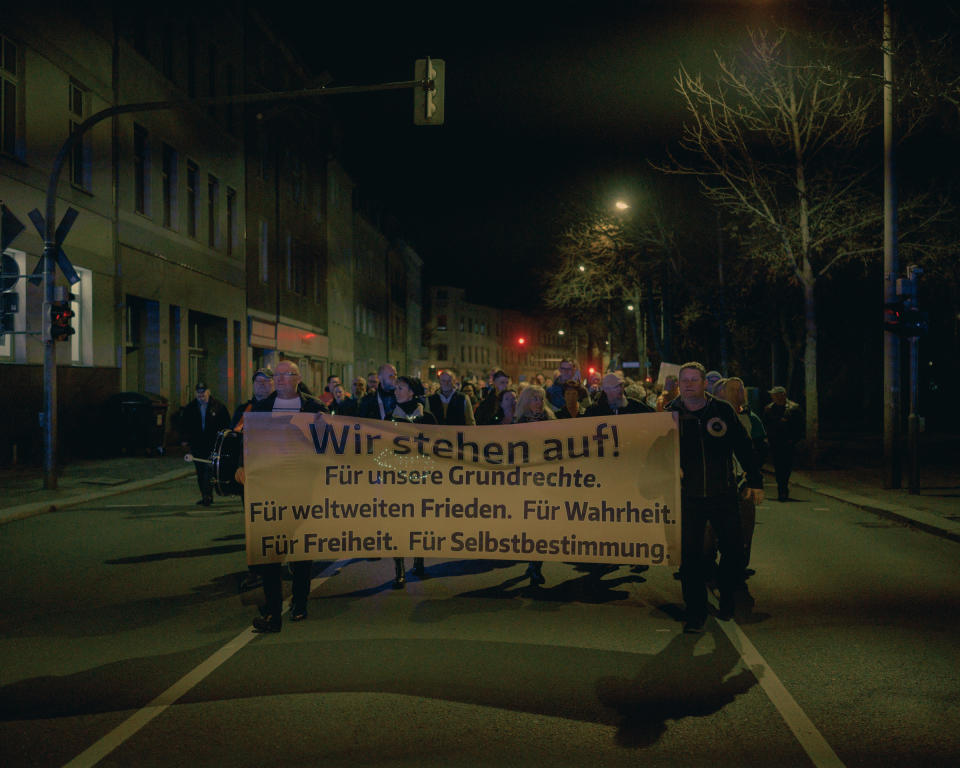The War in Ukraine Is Emboldening Germany’s Far Right

People march to protest against the rising cost of living in a demonstration organized by the right-wing Alternative for Germany (AfD) on Oct. 8, 2022 in Berlin, Germany. Credit - Omer Messinger—Getty Images
“We are the people! We are the people!”
Replete with boos, cheers, a brass band, and even a puppet show, this weekly gathering in the small eastern German city of Zittau could be easily mistaken for a pantomime performance. But the messages and ideas spread at the cobbled square in front of city hall are deadly serious: flags of far-right groups dot the scene as speakers rile up a crowd of 600.
“How did an ideology-driven elite manage to completely destroy the livelihoods of such a well-educated people as the Germans?” shouts Karin Viehweg, a far-right activist in her late 50s, over the loudspeaker in late November, nodding to the cost-of-living crisis and Germany’s left-leaning government led by Chancellor Olaf Scholz. “The citizens of the GDR didn’t go into the streets in 1989 to land in a new Red-Green socialism, did they?” she adds, referring to the Communist and Soviet-backed German Democratic Republic that ruled East Germany from 1949 to 1990. As Viehweg speaks, the crowd holds up posters demanding an end to arming Ukraine and restarting gas imports from Russia, calling sanctions “economic suicide.”
These demonstrations, held every Monday, have popped up all over eastern Germany—styled after weekly protests in the 1980s against the GDR. While the protests began in 2020 over COVID-19 lockdowns, they have swelled in recent months as anger mounts in Germany amid the economic fallout from Russia’s invasion of Ukraine. The Alternative for Germany, a far-right party, is a regular fixture at these demonstrations. The party has opposed arming Ukraine or sanctioning Russia—a position that is resonating with some voters as the AfD polls at near-record levels nationally and looks poised to come first in some state elections in 2024.
More from TIME
Read More: Volodymyr Zelensky Is TIME’s 2022 Person of the Year
Concerns over the far-right’s rise only grew larger this week, after 25 people were arrested Wednesday, including a former AfD MP, over plans to storm parliament. German officials said they expect more arrests to follow. That the coup planners had reportedly wanted to try to negotiate with Russia as soon as they took power has placed a larger spotlight on how the far-right in Germany—if not much of Europe—is being emboldened by the war in Ukraine.
“Cloud cuckoo land”
Overlooking the marketplace where protesters have gathered, in the towering yellow Zittau city hall that dates back to the mid-19th century, is mayor Thomas Zenker’s office. The 47-year-old has had a busy day trying to prepare the town in case energy shortages result in blackouts—a growing fear since Russia drastically reduced supplies to Europe. Unlike the protesters outside, Zenker does not blame Ukrainians or NATO, but rather the political establishment that made Germany so dependent on Russian gas. “We were living in Cloud Cuckoo Land,” he says. The mayor expresses irritation by a statement from Minister President of Saxony Michael Kretschmer that eastern Germans, or “Ossis,” think differently about Russia. “I remember how hated the Russians were in the GDR. They were the occupiers,” he says.
Zenker, who sports long, pointed sideburns and jet-black hair, could pass as a rock musician. But the Zittau native founded the independent voters’ coalition “Zittau can more!” in 2013 and ran for mayor after returning home to Saxony from stints abroad and in Berlin. Initially, his goals were to invest in education, promote international cooperation with neighboring Czechia and Poland, and entice people back to Zittau (the city’s population has halved since German reunification in 1990). But Zenker found himself locked in a struggle with the AfD and other fringe groups when the COVID-19 pandemic began; a struggle that has continued with Russia’s invasion of Ukraine. “There are people on the stage who you hear—and you ask if they live in the same world as us. ‘Great Replacement’ is normal by now. The reptilians are practically the only thing that haven’t come up yet,” he says, referring to two conspiracy theories espoused on the far-right.
Zenker blames much of the dissatisfaction driving the protests on unrealistic expectations set under East German socialism, which he says provided excellent public services but was financially unsustainable.
Robert Grünbaum, deputy director of the Federal Foundation for the Study of the Communist Dictatorship in Eastern Germany, agrees. “But at the same time, eastern Germans do not want to have anything to do with the state, and really distrust ‘those up there’,” he says. “The GDR saw itself as an anti-fascist state, so therefore, the Communist leadership didn’t see a need for dealing with the [Nazi] past… while keeping silent about right-wing extremism and racism.”
Today, eastern Germans are more likely to be critical of the West’s foreign policy. A recent poll shows that almost 60% agreed or partially agreed that the “Russian invasion of Ukraine is justified by NATO provocation.” Only half as many western Germans said the same.
Read More: Exclusive: Chancellor Olaf Scholz on a New Era for Germany
Indeed, many who gather outside Zenker’s office after marching the old boundaries of Zittau’s city wall see the mayor, and even Germany’s entire political system, as the enemy. One young man with a shaved head and face tattoos waves a placard urging to “overthrow tyrants” like Zenker and Scholz. Hermann Büll, a demonstrator in his 70s, describes the political situation today in Germany as “totally unequivocally scheisse. I’m a pensioner and in the east pensions are lower. After reunification, many lost their jobs, and the prices of everything are going up.”
The number of attendees has surged since the war in Ukraine began, according to Heiko Eksner, a tall, bearded man in his early 40s. Eksner was one of the first of just eight people to take part in the march in Zittau over two years ago; he has attended almost 200 by now. Eksner says “many here vote AfD” but that this is “an independent citizen’s initiative.” Freie Sachsen, a far-right group who support Saxon independence (“Säxit”), are also waving flags.

Town councilor Elke Koppatsch hangs at the edge of the demonstration. A member of the Left Party, Koppatsch says that many here are simply angry because the war is hurting pocketbooks. She says she met with a couple of demonstrators recently to hear their concerns, and helped them get sick pay they had been denied. “It’s hard work though,” Koppatsch admits. The Left Party, which like the AfD is more popular in eastern Germany, is divided on the war in Ukraine and contains a vocal pro-Russia faction centered around populist Sahra Wagenknecht, who has called sanctions “an unprecedented economic war against our biggest energy supplier.”
One voter who represents this crossover between far-left and far-right is Christel, who TIME speaks to a week later in Magdeburg, the capital of the neighboring state of Saxony-Anhalt. A 70-year-old former cultural attache for the GDR in Muammar Gaddafi’s Libya, she says “the West started this war” and that, “if I hear the word ‘Ukraine’ one more time, I will puke.” Christel insists that she doesn’t like the AfD’s nationalism but agrees with their opposition to arming Ukraine. “You don’t create peace with weapons!” she says, quoting a slogan common in the German peace movement. (The GDR defined itself as a “peace state” built from the rubble of World War II.)
The far-right anger at Ukrainians
Although things are calm in Zittau in late November, Saxony is a hotbed of violent extremism. Shelters for Ukrainian refugees have been firebombed, and while the anti-fascist Antifa frequently clash with the far-right in Leipzig and Dresden, they have demonstrated against energy price rises on the same day.
Ukrainians have grappled with the hold of these far-right groups. Mariana Yaremchyshyna, 23, tells TIME that a small group of friends held two counter-protests at an AfD demonstration in September in Lubmin, in the eastern German state of Mecklenberg Western Pomerania, where the Nordstream 2 pipeline was due to bring gas from Russia. (German officials froze the project in February; mysterious explosions struck the Nord Stream pipelines in September but investigators have been tight-lipped over naming a suspect.) The AfD has made major inroads in the state, polling seven percentage points higher than in the last state election in 2019, just behind the ruling Social Democratic Party.
Read More: Inside the Historic Mission to Provide Ukraine Aid and Arms
The protesters covered their mouths with black tape and held up posters describing the suffering brought on by the war in Ukraine. Yaremchyshyna says people screamed at them and said they were “paid crisis actors.” One drunk older man came and ripped a poster from one of them. When the police searched him, she says, it turned out he was carrying a knife.
“It was very traumatic for us,” Yaremchyshyna recalls. “I couldn’t get out of bed the whole next day. It’s just unbelievably cynical and of course it’s very painful to hear this victim blaming. I lost my friend [in the war] but you know they won’t believe you, they will always find a reason to justify Russia and Russians.”
Yaremchyshyna is hardly alone in her experiences.
While protesting in Leipzig in October against Russia’s war in Ukraine, Anastasia, 21, was confronted by AfD counter-protesters screaming “Nazis out” at her and fellow Ukrainians. Later, a friend with Ukrainian car license plates received a note on the dashboard that read, “Asylum tourists please stay home!” Anastasia says the note came just weeks after Friedrich Merz, the leader of the center-right Christian Democrats, accused Ukrainian refugees of “social tourism.” She says she no longer feels safe wearing Ukrainian symbols on the street. “The colder it gets, the worse it gets,” she sighs.


